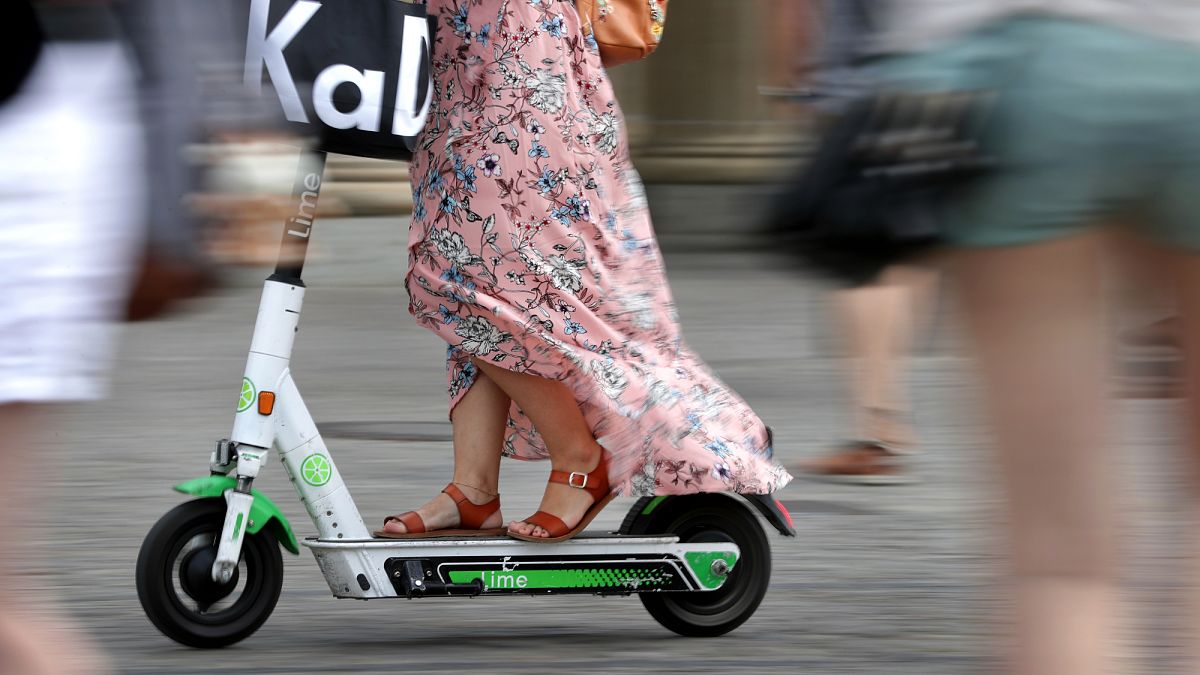People trying to rent a bright green electric scooter or bike via the Lime or Uber apps, received the following message on Friday: “Lime is no longer operating in Brussels. The Brussels authorities have forced Lime to suspend service in the city.”
The largest shared mobility operator, a subsidiary of Uber, was forced to withdraw 6,000 of its battery-powered scooters and bikes from the Belgian capital after the city’s government selected just three out of the previous seven such providers to officially operate in Brussels in 2023.
It comes as part of an attempt by Brussels to downsize micromobility units in the city from 20,000 to just 8,000. Estonia-based Bolt, the Dutch company Dott and Sweden’s Voi will each be allowed to operate 2,500 e-bikes in Brussels, and Bolt and Dott will be permitted to offer 4,000 scooters each for hire.
“By limiting the number of operators, we now have a workable and realistic number of shared scooters and shared bicycles in Brussels,” Mobility Ministery Elke Van den Brandt of Groen told Euronews.
She added that the decision was necessary to ensure the city’s public spaces are safe and accessible for all road users.
“The oversupply [of electric bikes and scooters] in recent years caused too much nuisance and today the three licensed operators are adhering to the ordinance of the Brussels Government.”
In addition to the reduced units, official drop zones will also be introduced where users can park the bikes and scooters.
Scooter- and bike-sharing operators had also been advocating for stricter regulations in the sector, arguing that the growing number of providers in the city made it increasingly difficult for them to remain viable.
Claims of lack of transparency
The decision to introduce restrictions on e-bike and scooter services in the Belgian capital had been made in 2023, however Lime and Voi both contested the decision.
Belgium’s Council of State granted the American and Swedish operators a short reprieve, allowing them to continue operating until the expiration of their license. Lime’s license ended on 2 July while Voi’s is set to end on 23 August.
The three operators selected to stay operational were chosen based on a number of criteria, including compliance with parking regulations and management of public space, safety of other road-users, quality of the vehicles, compliance with Belgium’s Highway Code and environmental impact.
However, Lime claimed the selection procedure was not transparent and that the Belgian capital did not make a fair analysis of the applications, local media reported.
“We believe the selection process was flawed and lacked transparency,” Benelux public affairs lead Sofie Staelraeve told local media.
Although Lime’s operating license has expired, their legal case is still ongoing and the company is still hopeful of a return to the city.
In the meantime, the American operator has filed an additional lawsuit against the city, claiming that no interim solution was provided. Lime argues it could face losses of around €1 million per month during the period it is unable to operate.
“If Lime wins the legal case, the Brussels Region may be liable for millions of euros in compensation,” the company told local media.
Scooters operated by Tier, Poppe and Pony already disappeared from the Brussels streets on 1 Feburary.
Many road users have been divided on the use of the self-service scooters, as they have been deemed controversial across Europe.
While scooters offer a more eco-friendly alternative to petrol-powered cars and help reduce traffic congestion in busy cities, they have widely faced criticism for contributing to accidents and cluttering public spaces.
Several European cities have banned e-scooters. Paris were the first to completely ban them in 2023. Meanwhile, Barcelona, Vienna, and Rome have all tightened rules and imposed additional restrictions.














